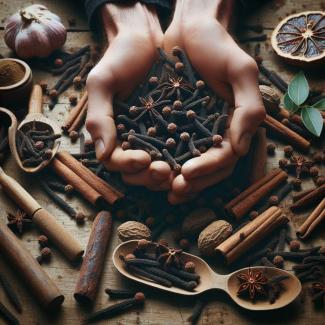
Cloves, scientifically known as Syzygium aromaticum, are small, dried flower buds harvested from the clove tree, native to the rainforests of tropical regions, primarily Indonesia. These aromatic plants have been valued for centuries for their unique flavors and fragrances, commonly used in culinary, alternative medicine, and cosmetics.
In the medical realm, cloves have garnered significant attention due to their potential medicinal properties. One key aspect of their action is their role as monoamine oxidase (MAO) inhibitors. Monoamine oxidases are enzymes that break down neurotransmitters such as serotonin, dopamine, and norepinephrine. Inhibiting these enzymes can increase the concentration of these neurotransmitters in the brain, which may lead to mood improvement and reduction of depression symptoms.
As antidepressants, cloves are used in various forms, most commonly found as dietary supplements or in the form of essential oil. Clove essential oil can be used in aromatherapy or applied to the skin after dilution in a carrier oil. Additionally, cloves can be incorporated into the diet as a spice or added to teas.
Despite their potential benefits, it is important to note that when using cloves as antidepressants, individual circumstances should be considered, and consulting a physician or alternative medicine specialist is advisable. Furthermore, it is essential to be aware of potential contraindications and side effects and to avoid overdosing, as this could have adverse health effects.
Using cloves effectively involves understanding their versatility and incorporating them into various aspects of daily life. Here's a detailed description of how to effectively use cloves:
- Culinary Use:
- Whole Cloves: Whole cloves are commonly used in cooking to add flavor and aroma to dishes. They are often added to soups, stews, rice dishes, and marinades.
- Ground Cloves: Ground cloves are versatile and can be used in baking, especially in desserts like cakes, cookies, and pies. They are also used in spice blends like pumpkin pie spice and garam masala.
- Infusions: Cloves can be added to hot beverages like tea, mulled wine, or cider to infuse them with their aromatic flavor.
- Health and Wellness:
- Essential Oil: Clove essential oil is used in aromatherapy to promote relaxation and alleviate stress. It can be diffused in the air or added to massage oils for topical application.
- Oral Health: Cloves possess antimicrobial properties and can be used to alleviate toothaches and promote oral hygiene. Chewing on a whole clove or applying clove oil to the affected area can provide relief.
- Home Remedies:
- Digestive Aid: Cloves are known to aid digestion and can be added to herbal teas or taken in supplement form to alleviate digestive discomfort.
- Cold and Flu Relief: Clove-infused steam inhalation can help alleviate congestion and respiratory symptoms associated with colds and flu.
- Natural Pest Repellent:
- Cloves are effective at repelling insects and pests due to their strong aroma. Placing whole cloves or sachets of cloves in closets, drawers, or pantry shelves can deter pests like moths and ants.
- DIY Projects:
- Potpourri: Cloves can be used in homemade potpourri blends to add fragrance to the home.
- Crafts: Dried cloves can be used in various crafts such as decorative wreaths or sachets.
- Skin Care:
- Clove oil can be diluted and applied topically to the skin to address issues like acne, inflammation, or fungal infections due to its antimicrobial and anti-inflammatory properties.
- Safety Precautions:
- When using clove essential oil topically, always dilute it with a carrier oil to prevent skin irritation.
- Pregnant or breastfeeding women should consult a healthcare professional before using clove oil or supplements.
- Use cloves in moderation, as excessive consumption may cause adverse effects such as digestive upset or allergic reactions.
By incorporating cloves into cooking, home remedies, aromatherapy, and DIY projects, individuals can effectively harness their aromatic flavor and medicinal properties to enhance various aspects of daily life.






